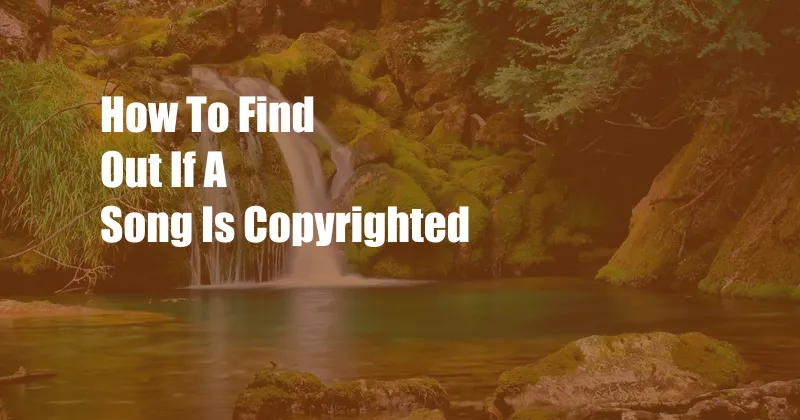
How to Find Out if a Song Is Copyrighted
Imagine a world where music flows freely without restrictions. Artists create, share, and inspire without fear of legal repercussions. Unfortunately, such a utopia doesn’t exist. Copyrights play a crucial role in protecting the rights of creators, but they can also create hurdles for those who wish to use their work. So, how do you navigate this complex landscape and determine if a song is copyrighted?
Copyright Basics
Copyright refers to a set of exclusive rights granted to creators over their original works, including songs. These rights typically include the right to reproduce, distribute, adapt, and perform the work. In general, any song that you did not create yourself is likely copyrighted.
How to Check Copyright Status
1. Check the Song’s Metadata:
Most digital music files contain metadata, which includes information about the song, such as its title, artist, and copyright status. You can often find this information by right-clicking on the file and selecting “Properties.”
2. Consult Copyright Databases:
There are several online databases that contain information on copyrighted works, such as the U.S. Copyright Office’s database and the World Intellectual Property Organization’s (WIPO) WIPO Lex database. You can search these databases by the song’s title, artist, or other identifying information.
3. Contact the Publisher or Record Label:
If the song is published or released by a music publisher or record label, you can contact them directly to inquire about the copyright status. They will have official records and can provide you with the necessary information.
4. Consider Creative Commons Licenses:
Some songs are released under Creative Commons licenses, which allow for certain types of use without obtaining permission from the copyright holder. You can find these licenses by searching for “Creative Commons” in the song’s metadata or on the publisher’s or artist’s website.
Exceptions and Fair Use
It’s important to note that not all uses of copyrighted songs require permission. The concept of “fair use” allows for certain limited uses of copyrighted material without infringement, such as for educational, non-commercial purposes. However, the interpretation of fair use can vary, so it’s always advisable to seek legal advice if you’re uncertain about whether your use falls within this exception.
Expert Advice and Tips
Navigating copyright law can be challenging. Here are some tips from experts to help you:
- Always assume that a song is copyrighted unless proven otherwise.
- Obtain written permission for any use of copyrighted material.
- Be cautious of songs that are available for free download or streaming.
- Keep records of all permission requests and grants.
- Consider using public domain or Creative Commons-licensed songs.
FAQs
Q: How long does a copyright last for a song?
A: In most countries, copyrights generally last for the life of the creator plus 50 to 100 years after their death.
Q: Can I use a copyrighted song in my video without permission?
A: Generally, no. Using a copyrighted song without permission can result in copyright infringement, regardless of the purpose or context of its use.
Q: Are there any free ways to use copyrighted music?
A: Yes, you can use public domain music or music released under Creative Commons licenses for free. However, you should always check the license terms carefully to ensure compliance.
Conclusion
Determining if a song is copyrighted is essential for avoiding copyright infringement. By understanding the basics of copyright law, using the methods described in this article, and following the expert advice provided, you can navigate the complex world of music copyright and use copyrighted songs in a safe and responsible manner.
Would you like to learn more about copyright law and how it relates to music? Let us know in the comments below.